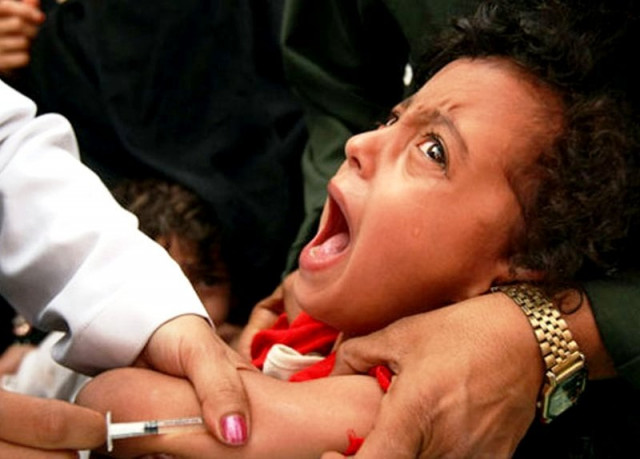Planning the budget: ‘We need to spend on immunisation’
Save the Children organises a pre-budget seminar to discuss the state of health in Sindh.

The participants urged the government increase the health budget to 10% of the GDP as the preventive side of health was being neglected. PHOTO: REUTERS/FILE
Given the outbreak of measles across Sindh and the resurgence of the polio virus, the province needs to spend on immunisation, stressed health experts on Wednesday.
NGO Save the Children's EveryOne campaign had organised a 'Pre-Budget Seminar on the Health Sector' at Avari Towers hotel to propose a significant budget allocation for immunisation, lady health workers and nutrition. The participants urged the government increase the health budget to 10% of the GDP as the preventive side of health was being neglected.
"Look at the lines during measles vaccinations," pointed out Prof Iqbal A Memon, the president of Pakistan Paediatric Association, adding that the preventive side of medicines needs our attention now.
"Sindh has low life expectancy and high incidence of illnesses yet the health department has not received its due allocation," disclosed Iqbal Detho, the provincial manager or Advocacy and Campaign at Save the Children. He said the health sector, with an allocated budget of Rs53.4 billion for the ongoing year, was among the top four priority sectors in the Sindh budget last year.

Muhammad Sabir, the principal economist of the Social Policy and Development Centre, broke down the problem in Sindh to challenges of equity, effectiveness and efficiency. The role of the private sector was 76.4% while the public sector contributed merely 17% in 2010 and 2011, he said. "It is a pro-poor budget," Sabir claimed, adding that it is due to the unavailability of funds that 21% children become ill in a year. The government has allocated only Rs0.1 billion on the Extended Programme of Immunisation and Rs158 million for the Sindh Nutrition Support Programme, he said. No allocations have been made for the lady health workers as this programme will be financed by the federal government until 2015 under the seventh NFC Award.
For Dr Riaz Ahmed Shaikh, the health budget is "pro-elite". "The health budget is stagnant at 3% since 2009 and large hospitals are being funded by other countries," said the head of the social sciences department at Shaheed Zulfikar Ali Bhutto Institute of Science and Technology.
Dr Shaikh said that the government cannot even address minor issues, such as deficiencies of vitamin A and iron. "The primary and secondary set-ups are being ignored while 85% of the budget goes to tertiary level," he said. "We need a 'bottom-to-up' approach."
"Every third women in Tharparkar has iron deficiency and every woman in the area demands water," said Dr Sahib Jan Badar, the head of Maternal, Neonatal and Child Health Programme. Dr Badar said that the vulnerable group is that of children and women. "It needs the most attention."
For good health, proper nutrition is essential, said Haris Gazdar of the Collective for Social Science Research, adding that the Sindh government had allocated was Rs158 million last year, but not a single penny was spent.
The participants urged the provincial government address health-related issues as top priority and spend the allocated budget honestly. "We make the laws but these laws are on paper only," disclosed Sindh Assembly member Sorath Thebo. She also highlighted that the health of children and mothers are in dismal condition. "We won't have a healthy nation if we don't seriously think for mothers and their babies," she added.
"We'll try to implement health-related policies," pledged another lawmaker, Syed Nasir Hussain Shah. "We are expecting things would change rapidly after the 18th Amendment but the process will take some more time," he added.
Published in The Express Tribune, May 22nd, 2014.



















COMMENTS
Comments are moderated and generally will be posted if they are on-topic and not abusive.
For more information, please see our Comments FAQ